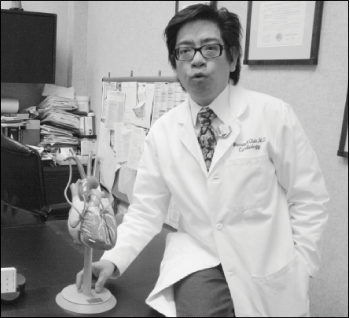 [/media-credit]
[/media-credit]
“We’re not so egocentric that we can’t recognize we haven’t done a good job in the Asian community,” said Sharma. “It’s abysmal.”
On Wednesday, Jan. 4, Sharma along with fellow physicians announced the appointment of Doctors Warren Chin and Cynthia Zhang, who plan to introduce new cardiac treatment services at the hospital. Dr. Chin is taking the helm of the hospital’s Asian cardiac services unit.
Asian-Americans often overlook symptoms of heart disease since they’re not culturally accustomed to complaining about these and other health problems, according to Chin and Zhang. As a result, their cardiac problems often go undiagnosed, and therefore, they’re more prone to having heart attacks and developing diabetes than are Caucasians, Chin said.
“People don’t know they have heart disease — that’s a basic problem in this community,” said Chin. “They think because they eat vegetables and rice that they don’t have heart problems. And they’re afraid of tests and procedures.”
“They wait until they’re really sick to come into the hospital, and they’ll miss a good window of treatment,” chimed in Zhang. “If we can start prevention, that’ll save so much emotional, physical and also financial burdens for everyone.”
Starting this month, the hospital will be renovating space for a new cardiac fitness and rehabilitation center, where physicians will conduct fitness tests and other cardio risk assessments set out by the American College of Cardiology. Patients will be assigned to 30- to 60-minute exercises on treadmills and have access to locker rooms and other amenities, according to Sharma.
The center, slated to open in the spring next to the hospital’s Wellness Center, could help detect cardiovascular problems in some patients and benefit others who are recovering from heart attacks or bypass surgery, Sharma said.
Later this year, the hospital will introduce new medical procedures such as cardiac magnetic resonance imaging (M.R.I.), and create a suite dedicated to angiography, a medical technique that locates clogged arteries in the body. That way, Chin and his team can conduct angiograms and other vascular disease prevention exams on site, rather than have to automatically send patients to Weill Cornell Medical Center in Midtown East.
Chin also plans to partner with the American Diabetic Center, at 185 Canal St. in Chinatown, to launch a series of diabetic workshops at both sites that would educate local pre-diabetics on how to lose weight and watch their eating habits.
Nearly 40 percent of citywide Chinese-Americans ages 65 and over have diabetes, according to the center’s founder, Dr. George Liu. “We’re working together to try to attack diseases as best we can,” he said.
Chin, a licensed cardiologist, has deep roots in the community. He runs a private practice at 254 Canal St., and, later this year, he will become executive director of the Chinese American Medical Society, which raises money for medical research and education and hosts medical conferences for doctors at its headquarters at 41 Elizabeth St. in Chinatown.
Born in the neighborhood and versed in Mandarin, Chin worked as an internist and physician for the health clinic that is now known as the Charles B. Wang Community Health Center in the 1970s and ‘80s. “I volunteered to do physical exams on immigrants such as screening for high blood pressure and diabetes,” he said.
In the late 1980s, one of Chin’s closest friends, who he had met at the clinic, set up shop as an attorney in Chinatown. That inspired him to follow suit in his own field. “I said, ‘why would you give up a prestigious [firm] job and open up a dinky office here?’ He said, ‘I’m looking to raise the standard of law practice in Chinatown.’ It sounded good!” By 1990, Chin’s private practice was up and running.
Chin advises nascent doctors to follow in his footsteps by providing care to those in their hometown communities. “I always encourage them, no matter where they end up, to try to come back to the community,” said the cardiologist. “It’s rewarding. To anyone else, you’re dispensable.”
And, while Chinatown is more health-literate than it was during Chin’s tenure at the neighborhood health clinic, he still has to keep reminding community members to monitor their health.
“The Chinese elderly have this mentality that they’re not worth it and that they don’t want to bother their children,” said Chin of his senior citizen patients. “A lot of grandkids are babysitting their grandchildren and need to continue to take care of them. So I tell them, ‘to continue to be useful to your family, you have to take care of yourself first.’”
































